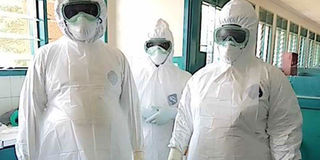Uganda confirms outbreak of Crimean-Congo fever in midwest

Health workers at Kagadi General Hospital are pictured in protective gear before attending to a patient who tested positive for the Crimean-Congo haemorrhagic fever, January 23, 2020. PHOTO | COURTESY
What you need to know:
- Robinah Nabbanja, minister of state for health in charge of general duties, told Xinhua by telephone that results from the Uganda Virus Research Institute had tested positive to CCHF.
- According to the ministry, one person has been admitted to the isolation camp in the district. The 23-year-old patient was admitted on Monday and tests were run on Tuesday.
- CCHF is a tick-borne illness transmitted to humans through tick bites. It can also be transmitted through direct contact with the blood, secretions and the organs of infected people.
Kampala,
Uganda's ministry of health on Wednesday confirmed an outbreak of the Crimean-Congo hemorrhagic fever (CCHF) in the midwestern district of Kagadi.
Robinah Nabbanja, minister of state for health in charge of general duties, told Xinhua by telephone that results from the Uganda Virus Research Institute had tested positive to CCHF.
"We have already dispatched a team of top health experts to the district. An isolation center has already been set up," Nabanja said.
"We are in touch with the district teams and the necessary medical supplies have already been availed to them," the minister added.She said tests for Ebola virus had indicated negative.
According to the ministry, one person has been admitted to the isolation camp in the district. The 23-year-old patient was admitted on Monday and tests were run on Tuesday.
LAST CASE
Uganda last experienced a CCHF outbreak in April last year in which one person died in the central district of Wakiso.
CCHF is a tick-borne illness transmitted to humans through tick bites. It can also be transmitted through direct contact with the blood, secretions and the organs of infected people.
According to the World Health Organization, a CCHF outbreak constitutes a threat to public health.
The global health body says the fever, endemic in Africa, the Balkans and the Middle East, is associated with a high case fatality ratio of 10 percent to 40 percent.





